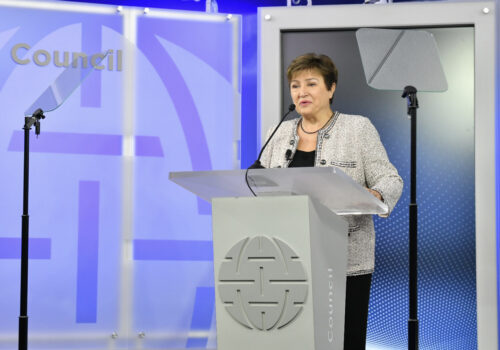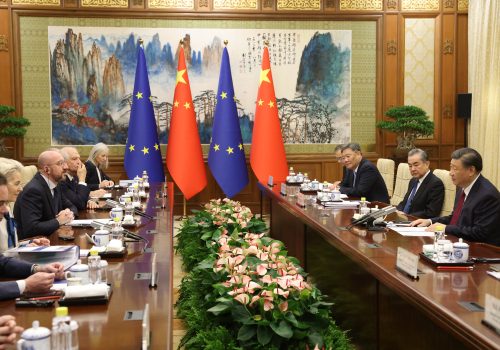IMF managing director: ‘Think of the unthinkable’
You might expect the world’s financial leaders, making their annual pilgrimage next week to Washington for the spring meetings of the International Monetary Fund (IMF) and the World Bank, to arrive amid a collective sigh of relief.
As IMF Managing Director Kristalina Georgieva said at the Atlantic Council yesterday, inflation is going down and global growth is increasing, driven by the United States and many emerging market economies. Also helping are increases in household consumption and business investment—and the easing of supply chain problems.
“We have avoided a global recession and a period of stagflation—as some had predicted,” said Georgieva. “But there are still plenty of things to worry about.”
The problem: Geopolitical risk is rising in a way that’s hard to measure, difficult to manage, and almost impossible to predict.
“Geopolitical tensions increase the risks of fragmentation of the world economy,” she said. “And, as we learned over the past few years, we operate in a world in which we must expect the unexpected.”
For example, this decade has already had a worldwide COVID-19 pandemic in 2020, a full-scale Russian invasion of Ukraine in 2022, and a Hamas terrorist attack in 2023, followed by a still-ongoing Gaza war.
From the moderator’s seat, I asked Georgieva whether she thought this level of geopolitical volatility was the new normal. “I think we have to buckle up for more to come,” she said, “because it is a more diverse world, and it is a world in which we have seen divergence, not just in economic fortunes, but also divergence in objectives.”
So how does the IMF manage that divergence?
Georgieva replied: It does so through the quality of its analysis, through the confidence that emerges from its financial strength, and through its staff’s ability to “quickly shift gears toward what the most important priority is.”
Oh, yes, the IMF also runs “think of the unthinkable” analyses, Georgieva said. The goal of which, she explained, was to “come up with the hypothesis of something that looks, you know, absurd and impossible, and what are we going to do if the impossible becomes a reality.”
Don’t miss the entirety of Georgieva’s compelling speech and discussion, rich with graphics and charts. She shared her insights on issues ranging from how artificial intelligence could reshape economies to why China’s current economic policy course is unsustainable.
China’s leadership is aware of that unsustainability, she noted. How Beijing changes course next is of global consequence, she explained, given that the country is contributing one third of global growth this year. “China making good choices would be good for everybody.”
It starts with tackling manufacturing overcapacity, which Georgieva pointed to as a significant issue. Expect to hear much more about that in the days ahead, as Chinese exports have become a key off-the-agenda topic for the ministers to debate next week.
Frederick Kempe is president and chief executive officer of the Atlantic Council. You can follow him on Twitter: @FredKempe.
This edition is part of Frederick Kempe’s Inflection Points Today newsletter, a column of quick-hit insights on a world in transition. To receive this newsletter throughout the week, sign up here.
Further reading
Thu, Apr 11, 2024
IMF head Kristalina Georgieva on how to avoid ‘the Tepid Twenties’ for the global economy
New Atlanticist By Katherine Walla
“Making the right policy choices will define the future of the world economy,” International Monetary Fund Managing Director Kristalina Georgieva said at the Atlantic Council.
Tue, Apr 9, 2024
Breaking down Janet Yellen’s comments on Chinese overcapacity
Sinographs By Hung Tran
It is reasonable to criticize and complain to China, but policymakers should remember that an end to overcapacity would mean a major shift in China’s economic model—which is exceedingly unlikely.
Mon, Dec 11, 2023
China’s manufacturing overcapacity threatens global green goods trade
Econographics By Niels Graham
Chinese lending is exacerbating a growing glut in its green manufacturing sector. Beijing is increasingly looking abroad to absorb excess capacity. This may have devastating effects for the global trading system as economies move to protect their own domestic industry.
Image: IMF Managing Director Kristalina Georgieva speaks at the Atlantic Council, April 11, 2024


